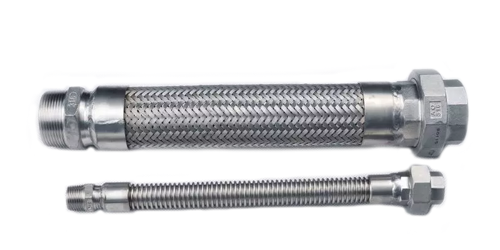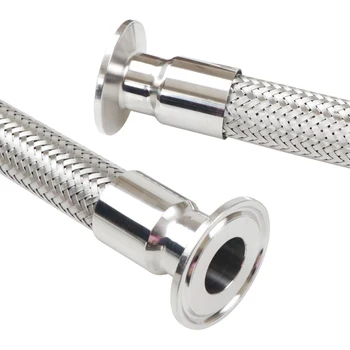Metal Hoses

Flexible stainless steel hoses are designed for conveying gases, chemicals, and steam.
They are manufactured in diameters ranging from DN 6 to DN 300.
Standard hose ends include threaded or flanged fittings, with custom options available upon request. End fittings are available in carbon steel, stainless steel, cast iron, and brass, and can be welded or brazed.
Stainless steel hoses are produced from materials such as H17N13M2T/1.4571/316Ti, 1H18N9T/1.4541/321, 00H17N14M2/1.4404/316L, with braiding made from 0H18N9/1.4301/304.

Applications of Metal Hoses
Metal hoses, including those made from stainless steel, are among the most popular solutions in the chemical, gas, and energy industries. Due to their durability and resistance to aggressive chemicals and high temperatures, they provide a reliable means of conveying various substances.
Manufactured in diameters from DN 6 to DN 300, stainless steel hoses offer a wide operating temperature range from -250°C to +600°C, making them suitable for industries requiring operation under extremely low or high temperatures.
Standardly, these hoses are equipped with threaded or flanged ends for easy and quick installation. Upon customer request, custom end fittings can be manufactured to meet specific needs and requirements.
Available end fittings are made from carbon steel, stainless steel, cast iron, and brass, providing a wide selection of materials for connecting stainless steel hoses to other system components.
Metal hoses are produced from various materials, such as H17N13M2T/1.4571/316Ti, 1H18N9T/1.4541/321, 00H17N14M2/1.4404/316L, with braiding made from 0H18N9/1.4301/304. Each of these materials is characterized by specific corrosion resistance and high durability, making them ideal for various applications.
Braiding made from 0H18N9/1.4301/304 is a popular choice due to its high flexibility and resistance to many chemicals, including high temperatures and corrosion. As a result, these hoses are an ideal solution for industries requiring durable and reliable tools for conveying various substances. They are used in many industrial processes, such as food processing, pharmaceutical production, petrochemical, chemical, and energy industries.
Stainless steel hoses are also very flexible and easy to install, saving time and costs. They are easy to maintain and clean, which is important in environments requiring high cleanliness. They can be manufactured according to various standards, such as EN, DIN, or ISO, ensuring their high quality and safety.
Due to their resistance to extreme temperatures, these hoses are ideal for conveying substances under extreme conditions. Their operating temperature range is from -250°C to +650°C, meaning they can operate under extremely low or high temperatures.
In the food and pharmaceutical industries, where cleanliness is crucial, stainless steel hoses are an ideal solution because they are easy to clean and disinfect, ensuring safety and hygiene during food processing and pharmaceutical production.
Although there are other, cheaper solutions like plastic or rubber hoses, stainless steel hoses are more durable and long-lasting. In applications requiring high strength and resistance to extreme temperatures, stainless steel hoses are usually more suitable. Rubber hoses, such as those made from silicone rubber, are popular in some industries due to their good heat resistance but are not as resistant to chemicals as metal hoses.
Investing in high-quality stainless steel hoses is cost-effective in harsh conditions, ensuring work safety, longevity, and efficiency of industrial processes.